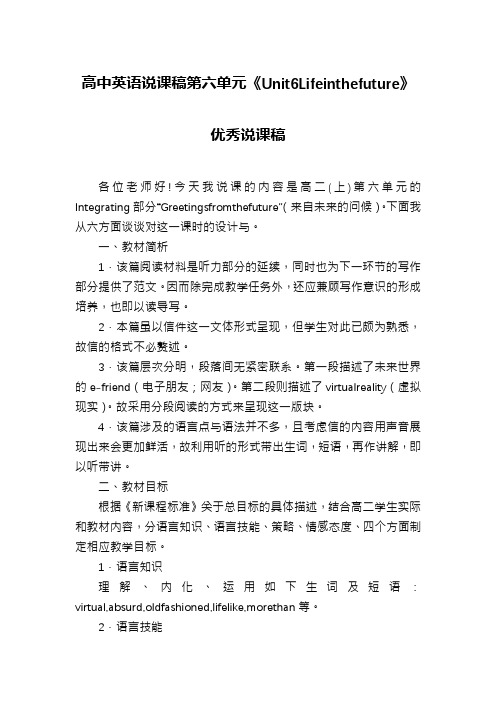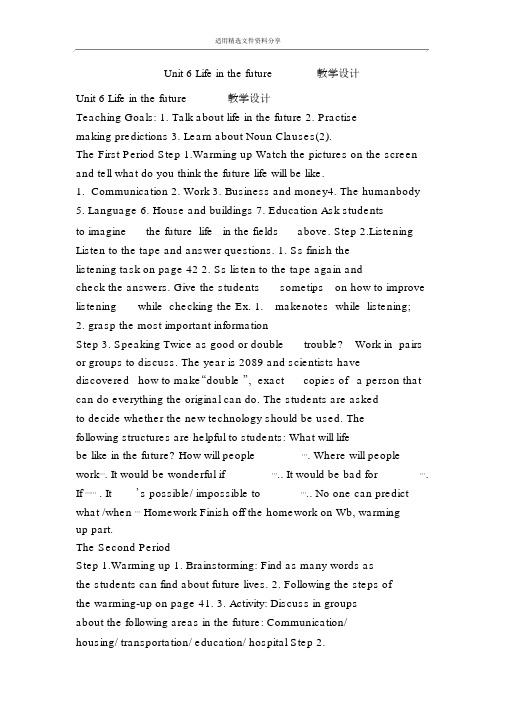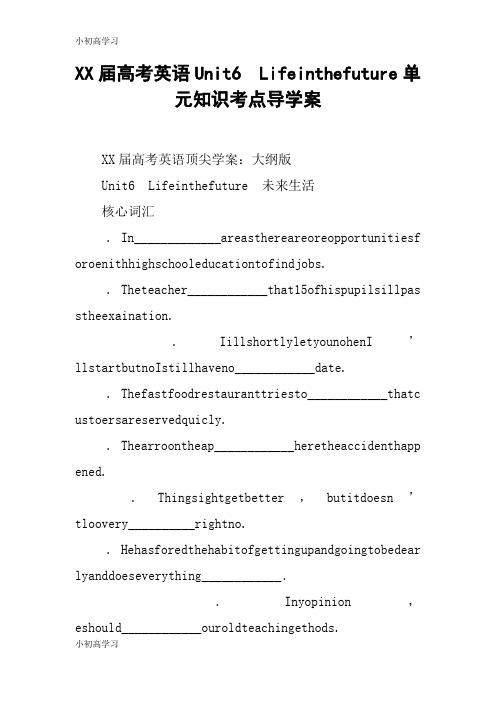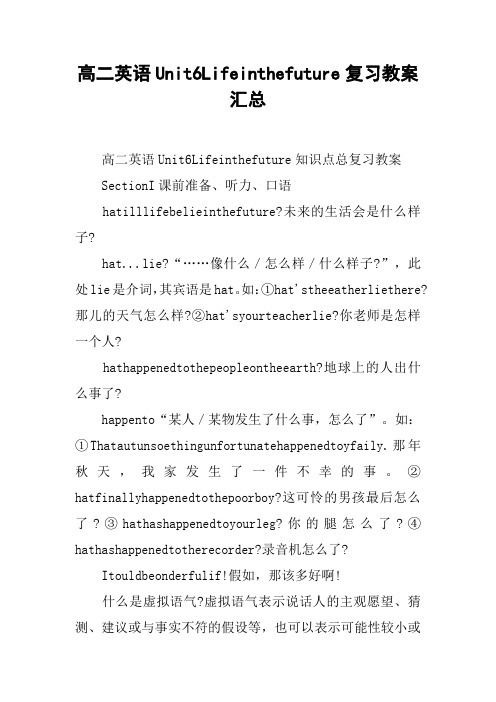2011届复习:unit6《lifeinthefuture》精品学案(大纲版第二册)
高中英语说课稿第六单元《Unit6Lifeinthefuture》优秀说课稿

高中英语说课稿第六单元《Unit6Lifeinthefuture》优秀说课稿各位老师好!今天我说课的内容是高二(上)第六单元的Integrating部分“Greetingsfromthefuture”(来自未来的问候)。
下面我从六方面谈谈对这一课时的设计与。
一、教材简析1.该篇阅读材料是听力部分的延续,同时也为下一环节的写作部分提供了范文。
因而除完成教学任务外,还应兼顾写作意识的形成培养,也即以读导写。
2.本篇虽以信件这一文体形式呈现,但学生对此已颇为熟悉,故信的格式不必赘述。
3.该篇层次分明,段落间无紧密联系。
第一段描述了未来世界的e-friend(电子朋友;网友)。
第二段则描述了virtualreality(虚拟现实)。
故采用分段阅读的方式来呈现这一版块。
4.该篇涉及的语言点与语法并不多,且考虑信的内容用声音展现出来会更加鲜活,故利用听的形式带出生词,短语,再作讲解,即以听带讲。
二、教材目标根据《新课程标准》关于总目标的具体描述,结合高二学生实际和教材内容,分语言知识、语言技能、策略、情感态度、四个方面制定相应教学目标。
1.语言知识理解、内化、运用如下生词及短语:virtual,absurd,oldfashioned,lifelike,morethan等。
2.语言技能听:捕捉特定信息、抓关键词,听懂信件内容。
说:能熟练掌握与话题相关的常用词汇与表达,同时使学生能就话题较好地完成一些开放性话题,以提高在真实语境中的交际能力。
读:获取相关信息,且进行skimming,scanning,carefulreading,generalization等阅读微技能训练。
3.学习策略学生能在一定程度上形成自主学习、信息处理和英语思维的能力。
4.情感态度(1)在有趣的话题激励下,诱导学生积极参与,充分调动他们学习的兴趣。
(2)立足现在,联系过去,对未来展开联想,让学生感受社会的进步。
三、教材重点、难点本节课的教学重点是学生略读、扫读、归纳等阅读微技巧能力的培养。
XX届高考英语Unit 6 Life in the future单元知识考点导学案

XX届高考英语Unit 6 Life in the future单元知识考点导学案XX届高考英语顶尖学案:大纲版Unit6 Lifeinthefuture 未来生活核心词汇.In_____________areastherearemoreopportunities forwomenwithhighschooleducationtofindjobs.2.Theteacher____________that15ofhispupilswillpasst heexamination.3.IwillshortlyletyouknowwhenI’llstartbutnowIstillhaveno____________date.4.Thefastfoodrestauranttriesto____________thatcust omersareservedquickly.5.Thearrowonthemap____________wheretheaccidenthapp ened.6.Thingsmightgetbetter,butitdoesn’tlookvery__________rightnow.7.Hehasformedthehabitofgettingupandgoingtobedearly anddoeseverything____________.8.Inmyopinion,weshould____________ouroldteachingmethods.9.Notallgoodscansatisfythecustomers’requirements,sothesituation____________thatweshouldtakeimmediate actiontosolvetheproblem.0.用important的适当形式填空:Allthreeteachersbelievedinthe____________ofkindness andgoodgovernment.Reducingairpollutionisreallyvery____________..urban 2.predicts 3.exact 4.ensure 5.indicates 6.hopeful7.regularly8.reform 9.requires 10.importance important高频短语.________________ 与……保持联系2.________________注意;留意3.________________处理;安排4.________________贮藏着;准备着;就要来到5.________________陪伴某人6.________________照常;像往常一样7.________________变成现实8._________________打扫干净;整理9.________________做出预测0._________________导致;引起1.________________瞥见.keepintouchwith 2.payattentionto 3.dealwith 4.instore pany 6.asusual etrue8.cleanup9.makeforecasts10.leadto 11.catchaglimpseof重点句式.TheInternetalso____________________customersandcompaniesinothercountries.互联网也使得公司可以和国外的客户及公司更容易地保持联系。
Unit6Lifeinthefuture教案

适用精选文件资料分享Unit 6 Life in the future教学设计Unit 6 Life in the future教学设计Teaching Goals: 1. Talk about life in the future 2. Practisemaking predictions 3. Learn about Noun Clauses(2).The First Period Step 1.Warming up Watch the pictures on the screen and tell what do you think the future life will be like.munication2. Work3. Business and money4. The humanbodynguage6. House and buildings7. Education Ask studentsto imagine the future life in the fields above. Step 2.Listening Listen to the tape and answer questions. 1. Ss finish thelistening task on page 42 2. Ss listen to the tape again andcheck the answers. Give the students sometips on how to improve listening while checking the Ex. 1.makenotes while listening; 2. grasp the most important informationStep 3. Speaking Twice as good or double trouble?Work in pairs or groups to discuss. The year is 2089 and scientists havediscovered how to make“double ”, exact copies of a person that can do everything the original can do. The students are askedto decide whether the new technology should be used. Thefollowing structures are helpful to students: What will lifebe like in the future? How will people⋯. Where will people work⋯. It would be wonderful if⋯.. It would be bad for⋯. If ⋯⋯ . It’s possible/ impossible to⋯.. No one can predict what /when ⋯ Homework Finish off the homework on Wb, warmingup part.The Second PeriodStep 1.Warming up 1. Brainstorming: Find as many words asthe students can find about future lives. 2. Following the steps ofthe warming-up on page 41. 3. Activity: Discuss in groupsabout the following areas in the future: Communication/housing/ transportation/ education/ hospital Step 2.Pre-reading 1. Show some pictures of highly-developpedtechnology used in daily life. 2. group work: describe thepictures. Step 3. While-reading 1. Scanning: Ss read quicklyand answer: What is the passage about? 2. Ss read and get themain ideas of each paragraph. Step 4. After-reading Comprehending by answering the following questions: Whatare the advantages of future transportation, smart card, online shopping and e-schools?What will happen in the field of health and medicine in the future?Why is it important to be lifelong learners? What should we do to make sure we will have a bright future? Step 5. Assignment 1. surf the internet and get more information about the topic.. 2. find a few sentences in thepassage which you like most,understand them entirely and then explain them to your deskmates. Record after teaching:The Third PeriodStep 1.Warming up Ask some Ss to recite the sentences that they have learnt last period. Step 2. Learning about the languageTeacher explain somelanguage points in the text on page 43--44.1. What life will be like in the future is difficult to predict. What’s⋯.like? What ’s the weather like today? What’s the picture like?2.E-commerce, or business done on the internet, is becoming more and more popular as people discover the advantages of online shopping. Done on the Internet The Past Participle used as Attributive.3. Homework will always be homework, but the schools of thefuture will probably be quite different from what they are today. the NounClause here used as object Step 3. Practice 1. Ss finish Ex 1 and 2 on page 45 by themselves. 2. check the answer. 3. Teacher gives Ss suggested answer and tell them why if theSs have any problem. Step 4. Assignment 1. Learn the useful expressions by heart. 2. Finish Wb. Ex1? C3 focusing onvocabulary on page 117--118. Step 5. Assignment Finish WbEx 2on page 117The Fourth Period Step 1. Pre-writing 1. Ss read the passageonP47 and get a general idea about it. 2. Explain the skillson how to organize a paragraph. Step 2. While-writing 1. Sswrite a short e-mail to an e-pal 2. Ss exchange their writingand correct the mistakes. 3.Ss rewrite the letter again.Step 3. After-writing Choose some samples and show them in class.Tips on writing:Pay attention to the form of writing a letter. Pay attention to the tense while writing.Pay attention to the structures of the sentences.Step 4. assignment Ss in group 3-5, discuss the life in 3044 Record after teaching:。
【K12学习】XX届高考英语Unit6 Lifeinthefuture单元知识考点导学案

XX届高考英语Unit6 Lifeinthefuture单元知识考点导学案XX届高考英语顶尖学案:大纲版Unit6 Lifeinthefuture 未来生活核心词汇.In_____________areasthereareoreopportunitiesf oroenithhighschooleducationtofindjobs..Theteacher____________that15ofhispupilsillpas stheexaination..IillshortlyletyounohenI’llstartbutnoIstillhaveno____________date..Thefastfoodrestauranttriesto____________thatc ustoersareservedquicly..Thearroontheap____________heretheaccidenthapp ened..Thingsightgetbetter,butitdoesn’tloovery__________rightno..Hehasforedthehabitofgettingupandgoingtobedear lyanddoeseverything____________..Inyopinion,eshould____________ouroldteachingethods..Notallgoodscansatisfythecustoers’requireents,sothesituation____________thateshouldtaeiediateacti ontosolvetheproble.0.用iportant的适当形式填空:Allthreeteachersbelievedinthe____________ofindnessa ndgoodgovernent.Reducingairpollutionisreallyvery____________.urban 2.predicts 3.exact 4.ensure 5.indicates 6.hopeful7.regularly8.refor 9.requires 10.iportance iportant高频短语.________________与……保持联系.________________注意;留意.________________处理;安排.________________贮藏着;准备着;就要来到.________________陪伴某人.________________照常;像往常一样.________________变成现实._________________打扫干净;整理.________________做出预测0._________________导致;引起1.________________瞥见eepintouchith 2.payattentionto 3.dealith 4.instore 5.eepsb.pany 6.asusual 7.etrue8.cleanup9.aeforecasts10.leadto 11.catchaglipseof重点句式.TheInternetalso____________________custoersan dpaniesinothercountries.互联网也使得公司可以和国外的客户及公司更容易地保持联系。
高二英语 Unit 6 Life in the future 知识精讲教案

高二英语 Unit 6 Life in the future知识精讲教案高二英语Unit6Lifeinthefuture知识精讲教案一.本周教学内容:Unit6–Lifeinthefuture二.教学目标:.mastersomesentencepatternsandimportantphrases.2.Practiseexpressingopinions.3.LearnaboutNounclauses,usedasSubject,objectandPred icative.4.writeadefintionparagraph,usingthewordsinthisunitt odescribelifeinfuture.三.教学重点与难点:Somedifficultphrasesandsentencepatterns四.具体内容:whileitisimpossibletoknowexactlywhatthefuturewillbe like,itispossibletousemodelsandtrendstomakeforecast saboutfuturedevelopments.Futuretransportationisgoingtobecleaner,fasterandsaf er.Newtechnologiesarebeingusedtodevelopenvironmenta llyfriendlyandefficientmeansoftransportation,suchas themaglevtrain.Scientistsarealsoworkingonnewfuelsan dengines.Thewaywedobusinesswillchange,paniesandconsum erswilldomostoftheirbusinessviatheInternet.This,int urn,willchangethewayweshopanddobusiness.Entertainme ntisbecominganimportantpartofshoppingandmuchofwhatw asdonebybusinessescannowbedonebytheconsumersandcust omersthemselves.Advancesinmedicalscienceandabetterunderstandingofth erolesplayedbydietandexercisewillallowustolivelonge randbehealthier.Therewillstillbediseasesinthefuture ,butourabilitytopreventandrespondtonewdiseaseswilli mprove.Educationwillbecomeevenmoreimportantthanitistoday,b utitsformmaychange.Learningwillnolongerbelimitedtoouryouthandtoschoolsandclassrooms.wewillneedtobecome lifelonglearnersandtherewillbemanydifferentplacesan dmodesoflearningavailabletous.Thebestwaytoprepareforthefutureistolearntoacceptand appreciatechange..catch/getaglimpseofsth.瞥见;明白Hesometimeswenttheretohaveglimpseofthemountaininthe distance.(n.)whenIsawhowworriedhewas,Icaughtaglimpseofhistruefee lings.Iglimpsedthefallsasourtrainwentby.(v.)2.at以……速度atveryhighspeed;atspeed高速driveattop/fullspeed全速travelataspeedofeightykillometresanhour3.major重要的;较大的Thecarneedsmajorrepairs.Theplayisamajorsuccess.4.contemporary当代的;现代的;同时期的;同一时代或年龄的人;当代人Hedevoteshimselftotheresearchonthecontemporaryart.johnismycontemporary;weareboth25.5.indicate表明;象征;预示Thearrowonasignindicatesthewaytogo.Theblackcloudsindicatethatitwillrainsoon.indicationn.Thereareindicationsthattheweatherischanging.6.systemthesolarsystemarailwaysystemapostalsystemanewsystemofelectionsthecapitalistsystem7.touchgetintouchwithlosetouchwithoutoftouchkeepintouchwith8.It’simportantforustolearnEnglish.Itisabadhabitforastudenttostayuplate.Itisverykindofyoutosayso.9.customer指在某一个商店买东西的顾客;shopper泛指买东西的人Themanageraskedhisshopassistantnottosaynotohiscusto mers.Thebusystreetisfullofshoppers.0.purchasen/vHegavehissonsomemoneyforthepurchaseofhisschoolbooks.Theyhavejustpurchasedanewhouseinthecountry.1.cashI’venocashonme,socanIpayyoutomorrow?wedon’tacceptcheques;wewantcash.canyoucashthispostalorderforthatoldladyplease?wherecanIgetthischequecashed?2.instead;insteadofSheprefersmakingherownfoodinsteadofbuyingitintheres taurant.Sinceyouaretired,letmegoinstead.3.suchas;forexample;namely;thatissuchas像……那样的;诸如……之类的;例如。
高二英语Unit6Lifeinthefuture复习教案汇总

高二英语Unit6Lifeinthefuture复习教案汇总高二英语Unit6Lifeinthefuture知识点总复习教案SectionI课前准备、听力、口语hatilllifebelieinthefuture?未来的生活会是什么样子?hat...lie?“……像什么/怎么样/什么样子?”,此处lie是介词,其宾语是hat。
如:①hat'stheeatherliethere?那儿的天气怎么样?②hat'syourteacherlie?你老师是怎样一个人?hathappenedtothepeopleontheearth?地球上的人出什么事了?happento“某人/某物发生了什么事,怎么了”。
如:①Thatautunsoethingunfortunatehappenedtoyfaily.那年秋天,我家发生了一件不幸的事。
②hatfinallyhappenedtothepoorboy?这可怜的男孩最后怎么了?③hathashappenedtoyourleg?你的腿怎么了?④hathashappenedtotherecorder?录音机怎么了?Itouldbeonderfulif!假如,那该多好啊!什么是虚拟语气?虚拟语气表示说话人的主观愿望、猜测、建议或与事实不符的假设等,也可以表示可能性较小或不可能发生的情况,虚拟语气常用于复合句中。
上句是一个含有条件状语从句的复合句,主句和从句的谓语动词使用了虚拟语气,表示“与现在事实相反的”一种假设。
那么,当说话人想表示“与现在事实相反的”假设时,主句和条件状语从句的谓语动词的“模版形式”是怎样的呢?请观察如下,例如:①IfIereyou,Iouldn'taccepthersuggestion.如果我是你,我不会接受她的建议。
②IfInetheansertothequestion,Ishouldtellyou.如果我知道问题的答案,我会告诉你的。
2011届英语总复习:unit6《lifeinthefuture》(大纲版第二册)

2011届英语总复习:Unit6《Life in the future》(大纲版第二册)I.单元知识点全览工欲善其事必先利其器高考须掌握的词汇:1.predict 2.exactly 3.important 4.reguIarly 5.medicine 6.educate 7.dlstant 8.requirement 9.Realize高考须掌握的短语:1.catch 2.in 3.to 4.with 5.inⅡ.考点过关过关斩将一马平川考点详解精剖细解入巿三分一、重点词汇.1.remain vi.继续保存,依然,仍然处于某种状态eg:His mind remains active.他的大脑仍然很活跃。
Mr Wang remained watching the scene for a long time.有很长时间王先生一直在看风景。
The window remained closed.窗户仍然关着。
A mumber of problems remain to be solved.有许多问题等待解决。
相关链接:remaining剩余的remainder n.剩余的人,事物或时间,残余部分用法拓展:(1)remain用作系动词时,后接形容词,动词-ing形式,过去分词,不定式的被动形式,介词短语和名词作表语。
(2)remain作不及物动词用时,着重指在别人已离去或事情有所变动的情况下,某物/某人仍继续“保留”或保持原本的状态。
(3)与stay的用法区别①二者均可作不及物动词,意为“停留,逗留”,均为延续性动词。
eg:How long will you stay/remain here?你将在这里呆多久?②二者均可用作系动词“保持……(状态),仍然……”,后跟形容词作表语。
eg:The window remained/stayed open all the night.窗户整夜没关。
③remain作不及物动词,有“留下,剩下”的意思,stay无此用法。
高二英语教案《Unit 6 Life in the future

高二英语教案《Unit 6 Life in the future》一、教学课型(读写课)二、教材分析1、教学内容本节课教学内容为人教社的NSEFC Book2A Uint 6 warming up,speaking,writing 3个部分。
2、教材内容分析及处理。
本节课教学内容为人教社的NSEFC Book2A Uint 6 warming up,speaking,writing 3个部分。
本单元的中心话题是“未来生活”,涉及到未来生活的各个方面:教育,语言,商业,交通,人际交流,人类健康等等。
本单元的教学内容给学生们展示了未来生活的画卷,并引导学生想象,大胆创新,尝试用英语表达自己的观点,想法。
而后再将自己的观点用已掌握的词汇语法知识简单串联成小短文。
这样学生们可以通过把所想,所说,所写有机的结合起来,加强他们对本单元知识的掌握,激发他们的学习热情和学习英语的兴趣。
在这个过程中教师对这三个部分的知识进行了重组,从而力求达到更好的教学效果。
3、教学目标。
通过教师提问,小组讨论,个人表达,激活学生思维,激发学生想象力,提高学生们的语言表达能力。
引导学生用简单词汇句子写小短文,并在此过程中鼓励学生多利用本单元新词汇语言点,进一步发展学生的语言综合运用能力。
三、教学设计1、总体思路(1)在英语教学过程中,听说读写四项语言技能是相辅相成,相互作用的。
“一张嘴便知有没有”是用来衡量一个英语学习人员的英语水平的一个常用标准。
可见“说”在英语语言运用中是很重要的,所以作为教师应该多鼓励学生说英语,以便于加深学生对已有知识的认知,学以致用。
(2)写作能力的培养也不是孤立的,应关注学生英语写作能力的稳固提高,多锻炼,由浅入深,由简单的几个句子到长句的运用,由简单句逐步过度到复杂句。
锻炼学生在写作过程中掌握单词,句子的用法。
2、能力扩展通过本单元的学习,要让学生了解科学技术进步在未来生活中的巨大推动作用。
使学生立志努力学习,为推动祖国发展做出贡献。
- 1、下载文档前请自行甄别文档内容的完整性,平台不提供额外的编辑、内容补充、找答案等附加服务。
- 2、"仅部分预览"的文档,不可在线预览部分如存在完整性等问题,可反馈申请退款(可完整预览的文档不适用该条件!)。
- 3、如文档侵犯您的权益,请联系客服反馈,我们会尽快为您处理(人工客服工作时间:9:00-18:30)。
2011届复习:Unit6《Life in the future》精品学案(大纲版第二册)Unit 6理解:要点诠释单词1.cure讲:vt.&n.治愈;治疗;治疗法;治疗药;解决方法短语:cure sb.of治愈某人的……病;改掉某人的……恶习例:This medicine will cure your headache.这药能治好你的头痛。
It seems that nobody can cure me of smoking.似乎没有人能使我戒烟。
His complete cure can’t be expected.他完全恢复健康遥遥无期。
An effective cure for cancer has not yet been found.对付癌症的有效疗法目前尚未发现。
链接·提示cure不能直接跟双宾,而应用cure sb. of sth.。
练:—People turn pale at the word AIDS.—But I’m sure,at some time in___________future,there will be___________cure for it.A.the;/B./;theC./;/D.the;a提示:本题考查冠词的用法。
in the future“将来”;in future“今后”,a cure“一种治疗方案”。
答案:D2.deal讲:deal可用作动词(vi.&vt)和名词。
主要义项有:作及物动词时意为“分配”。
作不及物动词时意为:“处理,应付,涉及,对待,交往,交易,经营”,此时常与介词with连用。
作名词是时意为“成交,交易”。
例:She dealt(out)each child a pencil.=She dealt a pencil(out)to each child.她分给每个孩子一枝铅笔。
This book deals with Middle East.这本书讨论中东问题。
You should deal fairly with them.你应该公平地对待他们。
I refuse to deal with him.我拒绝跟他打交道。
The store deals only in trousers.那商店只卖裤子。
Which firm do you deal with?你跟哪家公司交易?It’s/That’s a deal.那就成交了/一言为定。
链接·提示deal with常与how连用,而do with常与what连用。
练:Astronaut as he was,he didn’t know ___________ he had to ___________ in outer space.A.how;deal withB.what;deal withC.how;do withD.what;be done with提示:what作deal with的宾语。
注意:当deal with后面有宾语时,引导词用how;如果是do with,则用what。
答案:B3.require讲:vt.要求;命令结构:require that sb. (should) do sth.require sth. of sb.require sth.require sb. to do sth.sth.requires doing/to be done例:He requires that the work(should)be finished before dark.他要求这项工作应在天黑前完成。
What do you require of me?你对我有何要求?All the students are required to attend the meeting.所有学生都应出席这个会议。
The desk requires repairing/to be repaired.这张桌子需要修理了。
链接·提示在使用该词时,要注意两点,一是后面跟宾语从句时,从句的谓语动词用should do形式,且should 可以省略;二是在表示主语需要被……的意思时,后面跟v.ing的主动式表示被动或者用动词不定式的被动式。
练:—Do you think the Stars will beat the Bulls?—I don’t know,but this is the last time.The fans ___________them to win whole-heartedly.A.hopeB.requireC.preferD.demand提示:“球迷全身心地要求他们取胜。
”hope和demand不能跟动词不定式作宾补;prefer sb.to do.sth.“宁愿某人做某事”,与语境不符。
答案:B短语pay attention to讲:该短语的意思为“注意;留意;重视”。
注意to为介词,后面跟名词或v.ing作宾语。
例:You should pay attention to what he is saying.你应该注意他在说什么。
Too much attention was paid to the details.太过于注意细节了。
链接·拓展hold sb.s attention使某人注意;draw sb.s attention引起某人的注意;have sb.s attention 请某人注意;give attention to 对……注意练:The___________should be paid to the “group”effort rather than the “self”effort.A.effortB.attentionC.energyD.strength提示:此处为固定短语pay attention to“注意”的被动形式。
答案:B句型whenever/wherever引导让步状语从句讲:请观察下面教材原句:Distance education will help people study whenever they have time and wherever they may be.远程教育能帮助人们学习,无论他们何时有时间,无论人在哪里。
whenever无论何时;wherever无论何地。
以上两个词都是用来引导让步状语从句,相当于no matter when...或no matter where引导的从句。
例:Whenever I go out on a date,it begins to rain.我每次要出去约会,天就开始下雨。
Wherever I went,the dog followed me.无论我走到哪里,这条狗总是跟着我。
链接·提示注意这两个词都只能用来引导状语从句,不能用来引导名词性从句。
练:You can eat food free in my restaurant ________ you like.A.wheneverB.whereverC.whateverD.however提示:本题考查状语从句引导词的用法。
从句子的意思分析,此处用whenever表示“无论何时”。
其他选项与句子意思不相符合。
答案:A辨析1.remain,stayremain和stay两个词都可以用作连系动词,后接形容词,意为“(继续)保持某一状态”;二者还可以用作不及物动词,意为“待在某地”。
不同点是:(1)remain用作连系动词,其后接不定式或分词等时,不可换用stay。
(2)remain还可以用作不及物动词,意为“剩下、遗留”,这时也不可用stay替换。
即时练习:(1)Having a trip abroad is certainly good for the old couple,but it remains___________whether they will enjoy it.A.to seeB.to be seenC.seeingD.seen提示:本题考查非谓语动词的用法。
it为形式主语,真正的主语为主语从句whether they will enjoy it,分析其与see之间的关系,应为被动,另外remain后要用动词不定式表示将来的动作。
答案:B(2)She left with the___________20 cents.A.remainingB.leavingC.leftD.remained提示:注意表示“剩下的……”时,remaining放在所修饰词的前面,而left则要放在所修饰词的后面。
答案:A2.deal with,do with两个词为同义词,表示“处理;对付;相处”等,但要注意特殊疑问句的疑问词不同,deal with与how连用,而do with与what连用。
即时练习:Last summer I took a course on ___________poisonous gases.A.how to deal withB.what to deal withC.how to be dealt withD.what to be dealt with答案:A诱思:实例点拨【例1】(2010福建高考)The classroom is big enough___________,but We’ll have to move if we have more students.A.for the momentB.on the momentC.in a momentD.for a moment提示:从but后的句子来看,教室目前来说已足够大了。
“目前”应用for the moment。
on the moment“一……就……”;in a moment“一会儿”;for a moment“一段时间”。
答案:A讲评:和短语动词辨析一样,注意分清不同词组的不同意思。
【例2】(2010浙江高考)Maggie has been fortunate to find a job she loves and, ___________,she gets well paid for it.A.sooner or laterB.what’s moreC.as a resultD.more or less提示:what’s more“更重要的是……”;as a result“结果是……”;more or less“或多或少”。
由句意可知选B。
答案:B讲评:注意分析前后两句话的关系,是递进的或并列的。
【例3】(2010辽宁高考)This cake is very sweet.You___________a lot of sugar in it.A.should putB.could have putC.might putD.must have put提示:由句子的剩余部分我们应该知道本句的意思是“这蛋糕非常甜,你肯定放上了很多糖”。
